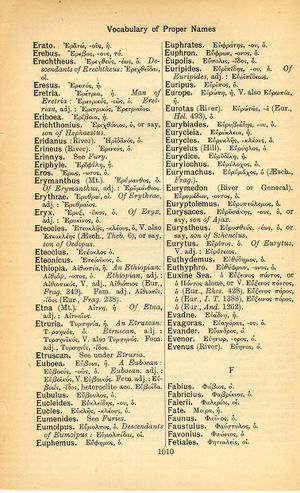Eretria: Difference between revisions
ἢ λέγε τι σιγῆς κρεῖττον ἢ σιγὴν ἔχε → either say something better than silence or keep silence (Menander)
(D_3) |
|||
| Line 8: | Line 8: | ||
{{Lewis | {{Lewis | ||
|lshtext=<b>Ĕrĕtrĭa</b>: ae, f., = Ἐρετρία.<br /><b>I</b> The [[principal]] [[city]] on the [[island]] of [[Euboea]], the birthplace of the [[philosopher]] [[Menedemus]], [[now]] Palaeo Castro, Plaut. Merc. 3, 4, 59; Mel. 2, 7, 9; Plin. 4, 12, 21, § 64; Cic. Ac. 2, 42; Liv. 32, 16; 35, 38 al.—<br /> <b>B</b> Derivv.,<br /> <b>1</b> Ĕrĕtrĭus, a, um, adj., Eretrian: [[creta]], Plin. 33, 13, 57, § 163; so, [[terra]], Cels. 5, 15; 6, 3.—Subst.: [[Eretria]], ae, f., Plin. 35, 6, 21, § 38; Vitr. 7, 14.—<br /> <b>2</b> Ĕrĕtrĭ-[[ensis]], e, adj., of [[Eretria]]: Gongylus, Nep. Paus. 2.—Subst., Ĕrĕtrienses, ium, m., the inhabitants of [[Eretria]], Liv. 35, 38.—<br /> <b>3</b> Ĕrĕtrĭăci, ōrum, m., philosophers of the [[school]] of [[Menedemus]], Cic. Ac. 2, 42, 109. —Also called,<br /> <b>4</b> Ĕrĕtrĭci, ōrum., m., Cic. de Or. 3, 17; Sen. Ep. 88 fin.—In sing.: Ĕrĕtrĭcus, an Eretrian [[philosopher]], Cic. Tusc. 5, 39.—<br /><b>II</b> A [[city]] of [[Thessaly]], in Phthiotis, [[now]] Tzangli, Liv. 32, 13; 33, 6. | |lshtext=<b>Ĕrĕtrĭa</b>: ae, f., = Ἐρετρία.<br /><b>I</b> The [[principal]] [[city]] on the [[island]] of [[Euboea]], the birthplace of the [[philosopher]] [[Menedemus]], [[now]] Palaeo Castro, Plaut. Merc. 3, 4, 59; Mel. 2, 7, 9; Plin. 4, 12, 21, § 64; Cic. Ac. 2, 42; Liv. 32, 16; 35, 38 al.—<br /> <b>B</b> Derivv.,<br /> <b>1</b> Ĕrĕtrĭus, a, um, adj., Eretrian: [[creta]], Plin. 33, 13, 57, § 163; so, [[terra]], Cels. 5, 15; 6, 3.—Subst.: [[Eretria]], ae, f., Plin. 35, 6, 21, § 38; Vitr. 7, 14.—<br /> <b>2</b> Ĕrĕtrĭ-[[ensis]], e, adj., of [[Eretria]]: Gongylus, Nep. Paus. 2.—Subst., Ĕrĕtrienses, ium, m., the inhabitants of [[Eretria]], Liv. 35, 38.—<br /> <b>3</b> Ĕrĕtrĭăci, ōrum, m., philosophers of the [[school]] of [[Menedemus]], Cic. Ac. 2, 42, 109. —Also called,<br /> <b>4</b> Ĕrĕtrĭci, ōrum., m., Cic. de Or. 3, 17; Sen. Ep. 88 fin.—In sing.: Ĕrĕtrĭcus, an Eretrian [[philosopher]], Cic. Tusc. 5, 39.—<br /><b>II</b> A [[city]] of [[Thessaly]], in Phthiotis, [[now]] Tzangli, Liv. 32, 13; 33, 6. | ||
}} | |||
{{Gaffiot | |||
|gf=<b>Ĕrĕtrĭa</b>,¹⁶ æ, f. (Ἐρετρία), Érétrie<br /><b>1</b> [ville de l’Eubée, [[patrie]] du [[philosophe]] Ménédème] : Cic. Ac. 2, 129 || <b>-trĭus</b>, a, um, (<b>-trĭēnsis</b>, e), Érétrien, d’Érétrie : Plin. 33, 163 ; Nep. Paus. 2, 2 || <b>-triăcī</b> (<b>-trĭcī</b>), ōrum, m., les disciples de Ménédème : Cic. Ac. 2, 109 ; de Or. 3, 62 || <b>-triēnsēs</b>, ium, m., habitants d’Érétrie : Liv. 35, 38, 4<br /><b>2</b> ville de Thessalie : Liv. 32, 13, 9 ; 33, 6, 10. | |||
}} | }} | ||
Revision as of 06:53, 14 August 2017
English > Greek (Woodhouse)
Ἐρέτρια, ἡ.
Man of Eretria: Ἐρετριεύς, -ιῶς, ὁ.
Eretrian, adj.: Ἐρετρικός, Ἐρετριαῖος.
Latin > English (Lewis & Short)
Ĕrĕtrĭa: ae, f., = Ἐρετρία.
I The principal city on the island of Euboea, the birthplace of the philosopher Menedemus, now Palaeo Castro, Plaut. Merc. 3, 4, 59; Mel. 2, 7, 9; Plin. 4, 12, 21, § 64; Cic. Ac. 2, 42; Liv. 32, 16; 35, 38 al.—
B Derivv.,
1 Ĕrĕtrĭus, a, um, adj., Eretrian: creta, Plin. 33, 13, 57, § 163; so, terra, Cels. 5, 15; 6, 3.—Subst.: Eretria, ae, f., Plin. 35, 6, 21, § 38; Vitr. 7, 14.—
2 Ĕrĕtrĭ-ensis, e, adj., of Eretria: Gongylus, Nep. Paus. 2.—Subst., Ĕrĕtrienses, ium, m., the inhabitants of Eretria, Liv. 35, 38.—
3 Ĕrĕtrĭăci, ōrum, m., philosophers of the school of Menedemus, Cic. Ac. 2, 42, 109. —Also called,
4 Ĕrĕtrĭci, ōrum., m., Cic. de Or. 3, 17; Sen. Ep. 88 fin.—In sing.: Ĕrĕtrĭcus, an Eretrian philosopher, Cic. Tusc. 5, 39.—
II A city of Thessaly, in Phthiotis, now Tzangli, Liv. 32, 13; 33, 6.
Latin > French (Gaffiot 2016)
Ĕrĕtrĭa,¹⁶ æ, f. (Ἐρετρία), Érétrie
1 [ville de l’Eubée, patrie du philosophe Ménédème] : Cic. Ac. 2, 129

